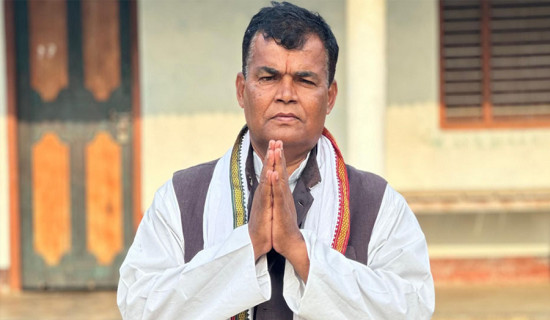- Wednesday, 4 March 2026
Give Impetus To Transitional Justice
Nepal made history when the decade-long Maoist insurgency of 1996-2006 finally ended and the Maoist rebels were incorporated into the government to stop the war and establish lasting peace. In 2006, the Comprehensive Peace Accord (CPA) was signed, formally ending the insurgency that, according to the OHCHR Nepal Conflict Report 2012, killed over 17,000 people and displaced tens of thousands more. However, Nepal has failed to make history in delivering justice to the victims and survivors of this devastating conflict. Nearly 20 years after the signing of the CPA, victims, survivors, and their families are still waiting for answers, accountability, and redress.
A recent conference, organised by Sancharika Samuha in collaboration with Amnesty International, brought together leading survivors, activists, and journalists in Godawari to demand the rights of those affected by the conflict. This gathering provided an important opportunity to reflect on how far Nepal has come — and how far it still has to go. After an extensive discussion reviewing facts and figures from 2006 to the present, a consensus emerged among participants that the struggles of victims and survivors of the Maoist insurgency remain far from resolved.
Consistent pressure
There was also broad agreement that although the press had strongly taken up this issue in the early years, sustained attention and consistent pressure have been lacking over time. Without continued public focus, the possibility of meaningful justice grows ever more remote. In 2015, two key transitional justice bodies were created: the Truth and Reconciliation Commission (TRC) and the Commission of Investigation on Enforced Disappeared Persons (CIEDP). These commissions were established with the mandate to investigate conflict-era crimes and recommend reparations, prosecutions, or amnesties where appropriate. However, victims and survivors such as Dr. Ram Bhandary, advocate Sushila Chaudhary, and Suman Adhikari have all spoken out forcefully to emphasise that justice remains elusive.
They argued that these commissions have not only failed to fulfill their purpose but have also shown little genuine intention of moving toward that goal. All three, along with human rights defender Charan Prasai, stressed that while the creation of the TRC and CIEDP initially generated hope, both bodies have been dominated by the country’s three major political parties. These same political forces were parties to the conflict, and after the commissions were established, they have continuously been involved in government. As a result, the political leadership has often appeared more preoccupied with advancing their own agendas than ensuring justice for survivors.
The activists have felt strongly that these appointments lack credibility because they do not include adequate representation from the victims themselves. Chaudhary noted that after the new appointments were announced, survivors’ networks conducted a countrywide survey to gather the opinions of those directly affected by the conflict. So far, the majority of respondents have said they do not trust that the new commissioners will deliver justice. All four activists agreed that their perspectives and needs must be central to the work of both commissions. They called upon the media to revive their efforts to sustain public pressure so that transitional justice does not become an empty promise.
Several senior journalists shared their memories of traveling to remote areas to document atrocities — and, in some cases, to help collect bodies from the sites of violence. Taranath Dahal, Executive Director of Freedom Forum and former chair of the Federation of Nepalese Journalists (FNJ), recalled traveling to Lamjung where Suman Adhikari’s father was killed by the Maoists. I met Ram Bhandary during a fact-finding mission to Manipur in 2022 to assess the situation of the disappeared during the clashes between the Kukis and the Meiteis. I remember how his face was etched with pain as he recounted his father’s disappearance at the hands of security forces in Lamjung in 2001. He shared that because his father’s body was never recovered, his family still clings to the hope that one day he might return home.
Chaudhary, who hails from Dang and now serves as the Vice-Chair of the Conflict Women Network, also shared that she still vividly remembers how her brother was killed by repeated firing and the peeling of his skin, and how her sister was disappeared by the State. Chaudhary said that when her family was struck by this horror, they had no idea what would become of them or how they would survive. As they began searching for justice, they met countless others carrying the same grief. This shared pain led them to form networks and alliances to organise and fight for their rights collectively. She refuted accusations that more than 30 organisations working on this issue are simply duplicating efforts or exploiting the cause.
Arduous pursuit
Over the years, many families have been displaced and worn down by the arduous pursuit of justice. Children of that era — people like Ram Bhandary, Sushila Chaudhary, and Suman Adhikari — are now grown professionals. Still, they continue to fight not only for themselves but for all who have suffered. They expressed deep frustration that although the Supreme Court ruled in 2015 against blanket amnesty for grave human rights violations, that ruling has yet to be implemented in practice. They also emphasised that the UN, OHCHR, Amnesty International, and Human Rights Watch have repeatedly criticised Nepal for failing to uphold victims’ rights.
However, there is a growing sense that international concern is waning. Many observers note that fatigue is setting in among the global community, as Nepal’s power structures continue to show little real commitment to addressing these issues. At this crucial juncture, the media must reclaim its proactive role in shining a light on these injustices and holding policymakers accountable. Journalists must build consistent pressure to ensure that transitional justice does not fade into a forgotten footnote of history. It should never be allowed to become yet another example of the old cliché: justice delayed is justice denied.
(Sharma is a senior journalist and women’s rights advocate. namrata1964@yahoo.com or on X @NamrataSharmaP.)















